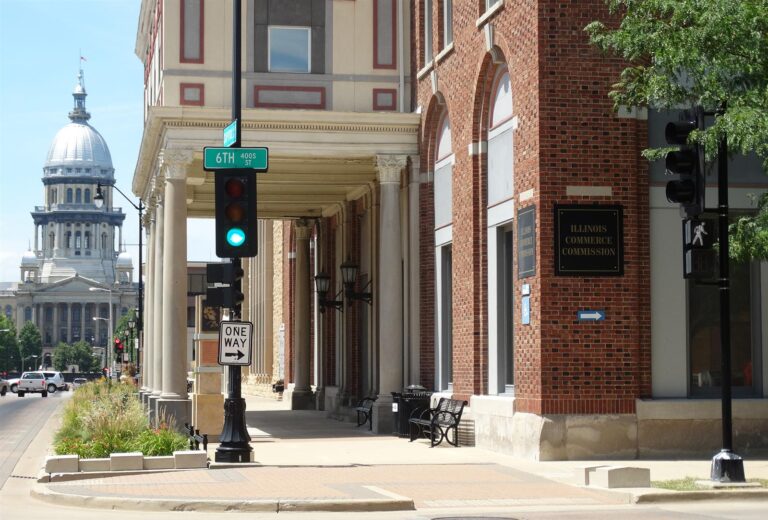The company behind a controversial carbon dioxide pipeline that would have spanned more than 1,300 miles across five states is walking back its permit application in Illinois.
Navigator CO2 on Tuesday voluntarily withdrew its permit application for the Heartland Greenway pipeline project that was pending before state regulators at the Illinois Commerce Commission. The company said it plans to “reassess the route” of the planned pipeline and its application with the state.
The pipeline’s purpose to capture carbon dioxide from industrial sources in South Dakota, Iowa, Minnesota and Nebraska and transport it to Illinois for sequestration underground.
“Being cognizant of ICC resources, Navigator will withdraw its current application with the intent to reinitiate Illinois permitting, if appropriate, when Navigator’s full evaluation is complete,” the company said in a statement.
The move came two weeks after regulators in South Dakota rejected the company’s application to build a portion of the pipeline in that state. Among other reasons, officials at that state’s Public Utilities Commission said the company failed to demonstrate that the project was safe, and that it could negatively impact the region’s development.
Last week, the company also asked the Iowa Utilities Board to pause the project’s permitting process there as well, mirroring the action it took Tuesday in Illinois.
This is the second time the company has withdrawn its permit application in Illinois. In January, it withdrew its first set of regulatory filings only to reapply the following month.
Navigator’s most recent route plans would have run through 14 Illinois counties, with sequestration sites in Montgomery and Christian counties, where the CO2 would be pumped into underground geologic formations for storage.
The project has been met with criticism from landowners, farmers and environmentalists in the 14 months since Navigator first filed its application.
Kathleen Campbell, a retired professor at SIU School of Medicine, told Capitol News Illinois she was alarmed late last year when she received a notice from Navigator that they were seeking an easement on her land in Glenarm, a small community in Sangamon County.
Campbell’s home, located in a subdivision about 10 miles south of Springfield, would have been fewer than 2,000 feet from the pipeline, even after the company altered their plan to place the route further from her house.
“If this pipeline goes through, our lives are still at risk,” Campbell said in an interview.
Concern about her safety – and the safety of others who live near the pipeline – led Campbell to help form the group Citizens Against Heartland Greenway Pipeline in the hopes of stopping the pipeline’s development. Three county governments – McDonough, Christian and Hancock – have joined the organization in opposition to the project.
Pipeline opponents have pointed to a 2020 incident in Satartia, Mississippi, as evidence that existing regulations for CO2 pipelines are insufficient.
In that small town, a pipeline owned by Denbury Resources transporting liquid carbon dioxide and hydrogen sulfide burst, causing noxious concentrations of carbon dioxide to blanket the community. Carbon dioxide can cause dizziness and painful convulsions. At high concentrations, the gas can be deadly within minutes.
According to documentation from the federal Pipeline and Hazardous Materials Safety Administration, the incident resulted in 45 hospitalizations and the evacuation of 200 people from the surrounding area.
PHMSA has since promised to institute new regulations on CO2 pipeline safety, although those guidelines are not expected to take effect until October of next year.
Others in Illinois have criticized the project for its potential use of eminent domain, a tool by which the government can take land for “public use,” even if its owner does not want to sell.
Navigator, in its application to the ICC and in other states, sought to use eminent domain to acquire the necessary land for its pipeline, although it said it would only be used as a last resort.
Still, a private company requesting to use eminent domain raised concern for landowners.
“We believe if Navigator CO2 is granted eminent domain for this project, it would set an extremely dangerous precedence for future eminent domain in the name of climate change and renewable energy projects,” Montgomery County Farm Bureau President Dennis Hand wrote in a letter to Farm Bureau members earlier this year.
These concerns have led some to say that state and federal officials should pause all pipeline development.
“What we desperately need is a moratorium,” Campbell said.
Some elected officials have also called for a pause on the construction of new pipelines while carbon dioxide transport regulations are being developed.
Last week, 13 progressive Democrats in Congress, including Reps. Jesus “Chuy” Garcia and Delia Ramirez of Illinois, sent a letter to President Joe Biden urging his administration to halt federal permitting of new CO2 pipelines.
Other elected officials are considering ways to regulate these types of projects in the long-term. State Rep. Ann Williams, D-Chicago, proposed a bill last spring that would have created new regulations at the state level for carbon capture and sequestration projects.
That bill was never called for a vote, but Williams, who is the chair of the House Energy and Environment Committee, told Capitol News Illinois that conversations on the subject have continued throughout the summer.
“I’m concerned about moving forward with a pipeline before we have a regulatory structure in place,” Williams said.
Williams said that it’s unlikely the subject will come up at the legislature’s veto session later this month.

